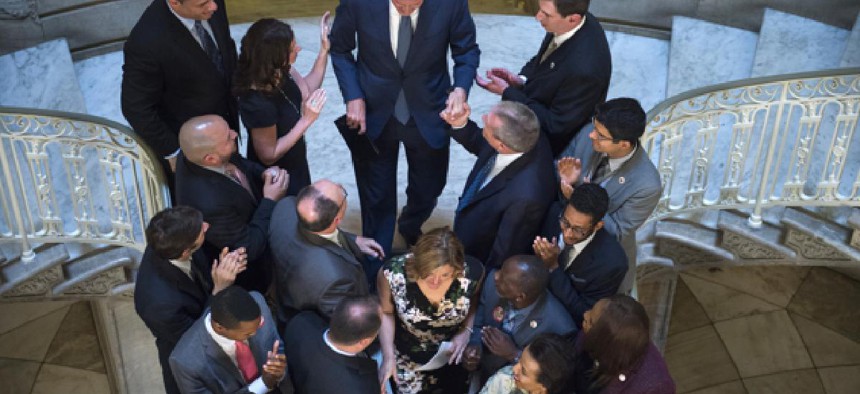Nonprofits ‘disappointed’ after budget excludes OTPS funding increase

“We didn’t win,” New York City Councilwoman Helen Rosenthal, chairwoman of the Contracts Committee, said last week at a panel hosted by New York Nonprofit Media. It was one day after the mayor and City Council announced a framework deal for the fiscal year that begins next month.
Human service nonprofits were disheartened after the city budget didn’t include a 2.5 percent line-item increase – amounting to $25 million – that they said would help them pay for non-staffing costs such as building repairs and technology upgrades.
The Council voted to pass the $82.1 billion spending plan on June 14.
Though the budget includes some discretionary funding increases for nonprofits and social services, such as libraries, cultural organizations and immigrant legal services, many nonprofits had also lobbied for a $25 million increase to help reimburse nonprofits for rising overhead costs such as rent, insurance premiums and repairs. At the end of May, the Human Services Council and Rosenthal, bolstered by a letter of support from nearly every other Council member, held a City Hall press conference arguing, in part, that “2.5 percent is sexy.”
At NYN Media’s OpCon conference, Rosenthal recounted that during budget negotiations with City Hall, Mayor Bill de Blasio said he would “talk about” increasing the “Other than Personal Services” budget line. But following the lack of funding in the finalized budget, she encouraged them to call the Brian Lehrer show, the WNYC news program where the mayor regularly fields questions from residents, and share instances of hardships faced by their organizations. “Think of an example of that in your mind’s eye that happened over the last few months and let the mayor know that,” she said.
“I truly believe that we’re at a breaking point and no one knows it,” she added.
She credited de Blasio with a willingness to address the issue, saying she believed that former Mayor Michael Bloomberg made up for the lack of city subsidies by courting private philanthropy. “And that kept quite a few providers happy, so it was able to be swept under the rug over and over and over again,” she said. “Now we have a mayor who’s willing to lift the rug and look.”
Freddi Goldstein, a spokeswoman for the mayor, said that the administration was committed to the nonprofit sector. “That is why we have made unprecedented investments in human services, including securing our contractors $15 an hour, raising average salaries for licensed social workers helping our homebound seniors, realigning shelter reimbursement rates, increasing reimbursement at 80 Beacons providing community programming and afterschool services, and more,” she said.
The recent sector-wide increases she cited include a salary increase for 340 licensed social workers from $35,000 to $50,000, a per-school increase of $550,000 for 80 Beacon centers and the gradual increase of contractors to $15 an hour by 2018.
Still, many nonprofits have complained of budgets strained by inflation, late payments and unfunded government mandates that weren’t covered by a 2.5 percent cost-of-living adjustment allocated to city-funded contractors in last year’s city budget. In fact, when NYN OpCon attendees were asked to raise their hand if their nonprofit had received the promised adjustment, few responded.
Paul Feuerstein, president and CEO of Barrier Free Living, whose clients include individuals who are disabled or victims of domestic violence, said that nearly all of his $8 million operation is publicly funded. Though OTPS funding is designated for non-employee costs, it can pay for contractors such as IT workers, an occupational therapist and interpreters to communicate with clients and employees who are hearing impaired.
“We were hoping for that,” he said. “Were we banking on that? We don’t bank on anything until I see the bottom line in black and white.”
Feuerstein called the funding critical for “the nuts and bolts of fixing stuff that can go wrong in a building that’s been used for over 25 years,” including replacing office supplies and upgrading donated computers. “The cost of insurance goes up every year, but the contracts don’t go up to deal with that cost of insurance,” he said. “So, do we take a risk and say, ‘we want our deductible to be bigger’ and hope and pray nothing goes wrong?”
Ben Thomases, the executive director of Queens Community House, a 40-year-old nonprofit that runs afterschool programs, delivers meals to older adults and provides other services, said it was a challenge to maintain the quality of services with reimbursements that fail to keep pace with rising costs. QCH, which employs more than 300 people and serves 20,000 people each year, is 90 percent government funded, he said.
He noted difficulties affording market-rate space in central Queens to provide English classes for adult immigrants “even though we have money to pay staff to deliver those classes, and there’s a great need in the Corona community, but we can’t afford to rent the space.” Additional OTPS funding could help cover such costs.
HSC Executive Director Allison Sesso said she was “very disappointed” in the lack of OTPS funding, particularly since it would have been evenly distributed across the nonprofit community, affecting an estimated 3,700 contracts.
“We’ve clearly demonstrated … there’s more and more evidence that the nonprofit human services sector is in financial distress,” she said. “And this was a real opportunity for them to start moving in the direction of fixing that problem, and they didn’t take it.”
Sesso was undeterred, saying the advocates would keep pushing for the increase in the mayor’s budget modification, which is typically released in November.
“We’re going to keep making noise about this,” she said. “We have an obligation to our communities to keep pushing on this and to ensure that the nonprofits are equipped to do the job that they’re contracted to do.”